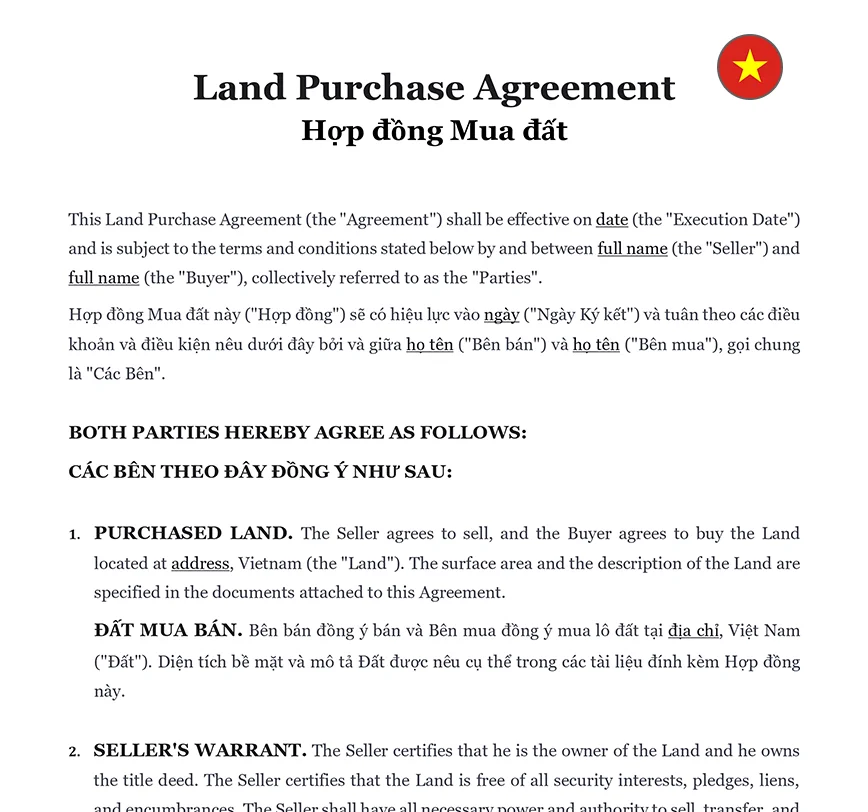Understanding the Legal Framework for Buying Land in Vietnam
The legal framework for buying land in Vietnam is governed by several intricate laws and regulations. Key among these is the Land Law 2013, which sets out the fundamental principles for land management and use in Vietnam. Additionally, the Law on Housing 2014 and related decrees provide further detail on housing-related transactions. Understanding these laws is crucial as they outline the rights and obligations of land users, the types of land ownership, and the precise procedures for land transactions. It is advisable to seek expert legal counsel to navigate these regulations effectively and ensure compliance with all legal requirements when buying land in Vietnam.
ℹ️ Read How to Buy Real Estate in Vietnam: A Legal Guide for broader real estate advice.
Importance of a Land Purchase Agreement
A Land Purchase Agreement is an indispensable document in the process of buying land in Vietnam. Use our Land Purchase Agreement Template for formalizing land purchases. This agreement should:
Detail Terms and Conditions: Clearly outline the terms and conditions of the sale, including the purchase price and payment terms.
Specify Obligations: Define the obligations of both the buyer and the seller.
Set Transaction Timeline: Specify the timeline for the transaction and any contingencies that could affect the sale.
Ensure Legal Protection: Having the agreement drafted by experienced legal professionals ensures that all potential issues are addressed and that the interests of both parties are protected.
Prevent Disputes: This document is a cornerstone of a secure land transaction and helps prevent disputes and misunderstandings. Check out Real Estate Purchase Agreement Template for comprehensive real estate transactions.
Verifying Land Ownership and Usage Rights
Before proceeding with buying land in Vietnam, it is imperative to:
1. Examine the Land Use Rights Certificate (LURC): Ensure that the LURC confirms the seller’s ownership and specifies the land’s permitted uses.
2. Match Seller’s Details: Verify that the seller’s name on the LURC matches their identification documents to confirm their identity.
3. Check for Encumbrances: Investigate any existing mortgages, liens, or easements on the property that could affect your ownership rights.
4. Verify Documents with Local Authorities: Confirm the authenticity of the LURC and other relevant documents through the local Land Registration Office.
5. Assess Land’s Legal Standing: Ensure there are no legal disputes or issues that could complicate your purchase or ownership of the land.
This thorough verification process is critical to avoid future legal complications and ensure a secure transaction. Learn How to Take a Property Off the Market Before Buying for managing property offers.
Conducting a Land Survey and Inspection
Conducting a land survey and inspection is an essential step when buying land in Vietnam. A professional surveyor will provide an accurate assessment of the land’s dimensions, boundaries, and condition. This helps to ensure that the land you are purchasing is free from encroachments or disputes. An inspection can reveal any issues with the land’s suitability for your intended use, such as soil stability, access to utilities, and zoning compliance. It is also advisable to inspect the land for any environmental concerns or restrictions that could impact its future use. These measures help protect your investment and ensure you are fully informed before finalizing the purchase. If you plan to undertake construction on the land, Themis Partner also offers a Construction Contract that will be necessary to outline the terms and responsibilities associated with the project.
- Remarks:
Explore Creating a Binding Building Agreement in Vietnam for details on construction contracts.
Understanding Land Use Restrictions
| ➤ Zoning Regulations: Different types of land in Vietnam are subject to zoning regulations that dictate how the land can be used. These regulations may restrict land to agricultural, residential, commercial, or industrial purposes. |
| ➤ Land Use Plans: Local land use plans outline how land within a specific area can be utilized. It is essential to review these plans to ensure that the land you are purchasing aligns with your intended use. |
| ➤ Conversion Restrictions: Land designated for a particular use, such as agriculture, cannot be easily converted to another use, like residential or commercial, without obtaining proper authorization. |
| ➤ Local Authorities: Consult with local authorities, such as the Department of Natural Resources and Environment, to obtain detailed information on zoning regulations, land use restrictions, and future development plans for the area. |
| ➤ Compliance and Legal Issues: Being aware of and adhering to land use restrictions helps avoid legal issues and ensures that your investment complies with local development policies. This proactive approach safeguards your investment and supports successful land usage. |











